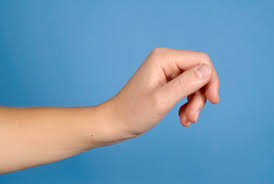记忆方法
1. see wrench.
中文词源
wrist 手腕
来自PIE*wer,弯,转,拧,词源同wring,wrest,用于指手腕。比较carpal.
英语词源
- wrist
-
wrist: [OE] The wrist is etymologically the ‘twisting’ joint. The word goes back to prehistoric Germanic *wristiz, which also produced German rist ‘instep, wrist’ and Swedish vrist ‘instep, ankle’. This was derived from the base *writh-, whose wr- sound seems originally to have been symbolic of the action of twisting. Variants of the base lie behind English wreath [OE], wrest [OE], and writhe [OE]; and gaiter may be related.
=> wreath, wrest, writhe - wrist (n.)
- Old English wrist, from Proto-Germanic *wristiz (cognates: Old Norse rist "instep," Old Frisian wrist, Middle Dutch wrist, German Rist "back of the hand, instep"), from Proto-Germanic *wreik- "to turn" (see wry). The notion is "the turning joint." Wrist-watch is from 1889. Wrist-band is from 1570s as a part of a sleeve, 1969 as a perspiration absorber.
权威例句
- 1. Masters shot a hand across the table and gripped his wrist.
- 马斯特斯迅速把手伸到桌对面,紧紧抓住他的手腕。
- 2. Hanging from his right wrist is a heavy gold bracelet.
- 他的右腕上戴着一只沉甸甸的金手镯。
- 3. The fate line begins close to the wrist.
- 命运线始于接近手腕的地方。
- 4. His fingers curled gently round her wrist.
- 他轻轻地握住她的手腕。
- 5. Eleanor jerked her wrist free.
- 埃莉诺猛地抽出了手腕。
